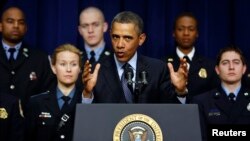WHITE HOUSE —
President Barack Obama has issued another appeal to Congress to work with him to avert the first stage of mandatory automatic cuts to domestic and defense spending scheduled to take effect March 1.
The $85 billion in cuts that could begin next week are the first part of $1.2 trillion in reductions President Obama and lawmakers agreed on two years ago to force budget savings amid partisan gridlock in Washington.
Republicans joined Democrats in voting for the mandatory cuts proposed by President Obama after grueling debt and deficit negotiations in 2011. Republicans want still deeper reductions beyond the $2.5 trillion in deficit reduction Mr. Obama says has been achieved.
Mr. Obama appeared in an auditorium with a group of 16 first responders, including police, firefighters, and emergency medical technicians who he said could lose their jobs if automatic cuts occur.
He urged Republicans to work with him to avoid what he called additional brutal self-inflicted wounds on the economy.
"Republicans in Congress face a simple choice," he said. "Are they willing to compromise to protect vital investments in education and health care and national security, and all the jobs that depend on them, or would they rather put hundreds of thousands of jobs and our entire economy at risk just to protect a few special interest tax loopholes that benefit only the wealthiest Americans and biggest corporations?"
The Speaker of the House of Representatives, Republican John Boehner, accused Mr. Obama of proposing more government spending and failing to offer "a credible plan" that Congress can pass.
Senate Republican Minority Leader Mitch McConnell said Mr. Obama "still prefers campaign events to common sense, bipartisan action."
Mr. Obama said his door remains open to negotiations to avoid the mandatory cuts and achieve balanced reductions. "Nobody should want these cuts to go through because the last thing our families can afford right now is pain imposed unnecessarily by partisan recklessness and ideological rigidity here in Washington," he said.
Responding to questions about Mr. Obama's personal involvement in negotiations, White House Press Secretary Jay Carney insisted to reporters that communication lines remain open.
The co-chairmen of a bipartisan fiscal commission Mr. Obama appointed issued revised proposals on Tuesday to address the nation's fiscal problems. Erskine Bowles and former senator Alan Simpson proposed $2.4 trillion in deficit reduction over 10 years, including spending cuts and health-care and tax reforms.
Bowles addressed the impact of across-the-board cuts. "There is no business in the country that makes its cuts across-the-board, you go in there and you try to surgically try to cut those things that have the least adverse effect on productivity," he said.
White House spokesman Jay Carney said the latest Simpson-Bowles proposal supports Mr. Obama's position that the only way to tackle deficit and debt problems is with a balanced plan.
What's Next After the Fiscal Cliff Deal
What's Next After the Fiscal Cliff Deal- Late February: Extraordinary measures to extend the nation's borrowing limit will be exhausted.
- March 1: Large automatic spending cuts, or sequestration, would take effect without congressional action.
- March 27: A temporary funding measure expires. Government agencies will run out of money unless Congress adopts a new bill.
Republicans joined Democrats in voting for the mandatory cuts proposed by President Obama after grueling debt and deficit negotiations in 2011. Republicans want still deeper reductions beyond the $2.5 trillion in deficit reduction Mr. Obama says has been achieved.
Mr. Obama appeared in an auditorium with a group of 16 first responders, including police, firefighters, and emergency medical technicians who he said could lose their jobs if automatic cuts occur.
He urged Republicans to work with him to avoid what he called additional brutal self-inflicted wounds on the economy.
"Republicans in Congress face a simple choice," he said. "Are they willing to compromise to protect vital investments in education and health care and national security, and all the jobs that depend on them, or would they rather put hundreds of thousands of jobs and our entire economy at risk just to protect a few special interest tax loopholes that benefit only the wealthiest Americans and biggest corporations?"
The Speaker of the House of Representatives, Republican John Boehner, accused Mr. Obama of proposing more government spending and failing to offer "a credible plan" that Congress can pass.
Senate Republican Minority Leader Mitch McConnell said Mr. Obama "still prefers campaign events to common sense, bipartisan action."
Mr. Obama said his door remains open to negotiations to avoid the mandatory cuts and achieve balanced reductions. "Nobody should want these cuts to go through because the last thing our families can afford right now is pain imposed unnecessarily by partisan recklessness and ideological rigidity here in Washington," he said.
Responding to questions about Mr. Obama's personal involvement in negotiations, White House Press Secretary Jay Carney insisted to reporters that communication lines remain open.
The co-chairmen of a bipartisan fiscal commission Mr. Obama appointed issued revised proposals on Tuesday to address the nation's fiscal problems. Erskine Bowles and former senator Alan Simpson proposed $2.4 trillion in deficit reduction over 10 years, including spending cuts and health-care and tax reforms.
Bowles addressed the impact of across-the-board cuts. "There is no business in the country that makes its cuts across-the-board, you go in there and you try to surgically try to cut those things that have the least adverse effect on productivity," he said.
White House spokesman Jay Carney said the latest Simpson-Bowles proposal supports Mr. Obama's position that the only way to tackle deficit and debt problems is with a balanced plan.












